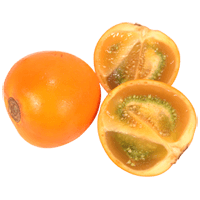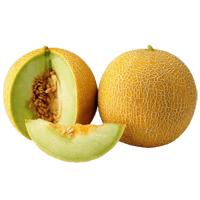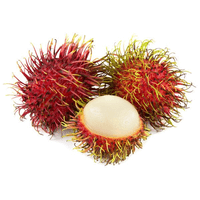Horned melon nutrition: calories, carbs, GI, protein, fiber, fats
Horned melon (Kiwano)
*all the values are displayed for the amount of 100 grams
Top nutrition facts for Horned melon
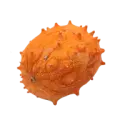
| Calories ⓘ Calories for selected serving | 44 kcal |
| Glycemic index ⓘ Gi values are taken from various scientific sources. GI values less than 55 are considered as low. Values above 70 are considered as high. | 48 (low) |
| Glycemic load | 8 (low) |
| Net Carbs ⓘ Net Carbs = Total Carbohydrates – Fiber – Sugar Alcohols | 8 grams |
| Default serving size ⓘ Serving sizes are mostly taken from FDA's Reference Amounts Customarily Consumed (RACCs) | 1 cup (233 grams) |
| Acidity (Based on PRAL) ⓘ PRAL (Potential renal acid load) is calculated using a formula. On the PRAL scale the higher the positive value, the more is the acidifying effect on the body. The lower the negative value, the higher the alkalinity of the food. 0 is neutral. | -1.6 (alkaline) |
Horned melon calories (kcal)
| Calories for different serving sizes of horned melon | Calories | Weight |
|---|---|---|
| Calories in 100 grams | 44 | |
| Calories in 1 cup | 103 | 233 g |
Horned melon Glycemic index (GI)
Gi values are taken from various scientific sources. GI values less than 55 are considered as low. Values above 70 are considered as high.
Horned melon Glycemic load (GL)
Mineral coverage chart
Mineral chart - relative view
Vitamin coverage chart
Vitamin A:
21µg of 900µg
2.3%
Vitamin E:
0mg of 15mg
0%
Vitamin D:
0µg of 20µg
0%
Vitamin C:
16mg of 90mg
18%
Vitamin B1:
0.08mg of 1mg
6.3%
Vitamin B2:
0.05mg of 1mg
3.5%
Vitamin B3:
1.7mg of 16mg
11%
Vitamin B5:
0.55mg of 5mg
11%
Vitamin B6:
0.19mg of 1mg
15%
Folate:
9µg of 400µg
2.3%
Vitamin B12:
0µg of 2µg
0%
Vitamin K:
0µg of 120µg
0%
Vitamin chart - relative view
Macronutrients chart
Protein:
Daily Value: 4%
1.8 g of 50 g
1.8 g (4% of DV )
Fats:
Daily Value: 2%
1.3 g of 65 g
1.3 g (2% of DV )
Carbs:
Daily Value: 3%
7.6 g of 300 g
7.6 g (3% of DV )
Water:
Daily Value: 4%
89 g of 2,000 g
89 g (4% of DV )
Other:
0.4 g
0.4 g
All nutrients for Horned melon per 100g
| Nutrient | Value | DV% | In TOP % of foods | Comparison |
| Vitamin A | 7µg | 1% | 54% | |
| Calories | 44kcal | 2% | 89% |
1.1 times less than Orange
|
| Protein | 1.8g | 4% | 79% |
1.6 times less than Broccoli
|
| Fats | 1.3g | 2% | 72% |
26.4 times less than Cheese
|
| Vitamin C | 5.3mg | 6% | 29% |
10 times less than Lemon
|
| Net carbs | 7.6g | N/A | 50% |
7.2 times less than Chocolate
|
| Carbs | 7.6g | 3% | 54% |
3.7 times less than Rice
|
| Magnesium | 40mg | 10% | 26% |
3.5 times less than Almonds
|
| Calcium | 13mg | 1% | 68% |
9.6 times less than Milk
|
| Potassium | 123mg | 4% | 77% |
1.2 times less than Cucumber
|
| Iron | 1.1mg | 14% | 56% |
2.3 times less than Beef broiled
|
| Copper | 0.02mg | 2% | 92% |
7.1 times less than Shiitake
|
| Zinc | 0.48mg | 4% | 71% |
13.1 times less than Beef broiled
|
| Phosphorus | 37mg | 5% | 81% |
4.9 times less than Chicken meat
|
| Sodium | 2mg | 0% | 96% |
245 times less than White bread
|
| Manganese | 0.04mg | 2% | 68% | |
| Vitamin B1 | 0.03mg | 2% | 84% |
10.6 times less than Pea raw
|
| Vitamin B2 | 0.02mg | 1% | 94% |
8.7 times less than Avocado
|
| Vitamin B3 | 0.57mg | 4% | 76% |
16.9 times less than Turkey meat
|
| Vitamin B5 | 0.18mg | 4% | 82% |
6.2 times less than Sunflower seeds
|
| Vitamin B6 | 0.06mg | 5% | 74% |
1.9 times less than Oats
|
| Folate | 3µg | 1% | 87% |
20.3 times less than Brussels sprouts
|
| Trans fat | 0g | N/A | 100% |
N/A
|
Check out similar food or compare with current
NUTRITION FACTS LABEL
Nutrition Facts
___servings per container
Serving Size ______________
Serving Size ______________
Amount Per 100g
Calories 44
% Daily Value*
1.9%
Total Fat
1.3g
0
Saturated Fat 0g
0
Trans Fat
0g
0
Cholesterol 0mg
0.09%
Sodium 2mg
2.5%
Total Carbohydrate
7.6g
0
Dietary Fiber
0g
Total Sugars 0g
Includes ? g Added Sugars
Protein
1.8g
Vitamin D
0mcg
0
Calcium
13mg
1.3%
Iron
1.1mg
14%
Potassium
123mg
3.6%
*
The % Daily Value (DV) tells you how much a nutrient in a serving of food contributes to a daily diet. 2,000 calories a day is used for general nutrition advice.
Health checks
ⓘ
Dietary cholesterol is not associated with an increased risk of coronary heart disease in healthy individuals. However, dietary cholesterol is common in foods that are high in harmful saturated fats.
Source
Low in Cholesterol
ⓘ
Trans fat consumption increases the risk of cardiovascular disease and mortality by negatively affecting blood lipid levels.
Source
No Trans Fats
ⓘ
Saturated fat intake can raise total cholesterol and LDL (low-density lipoprotein) levels, leading to an increased risk of atherosclerosis. Dietary guidelines recommend limiting saturated fats to under 10% of calories a day.
Source
Low in Saturated Fats
ⓘ
While the consumption of moderate amounts of added sugars is not detrimental to health, an excessive intake can increase the risk of obesity, and therefore, diabetes.
Source
Low in Sugars
Horned melon nutrition infographic
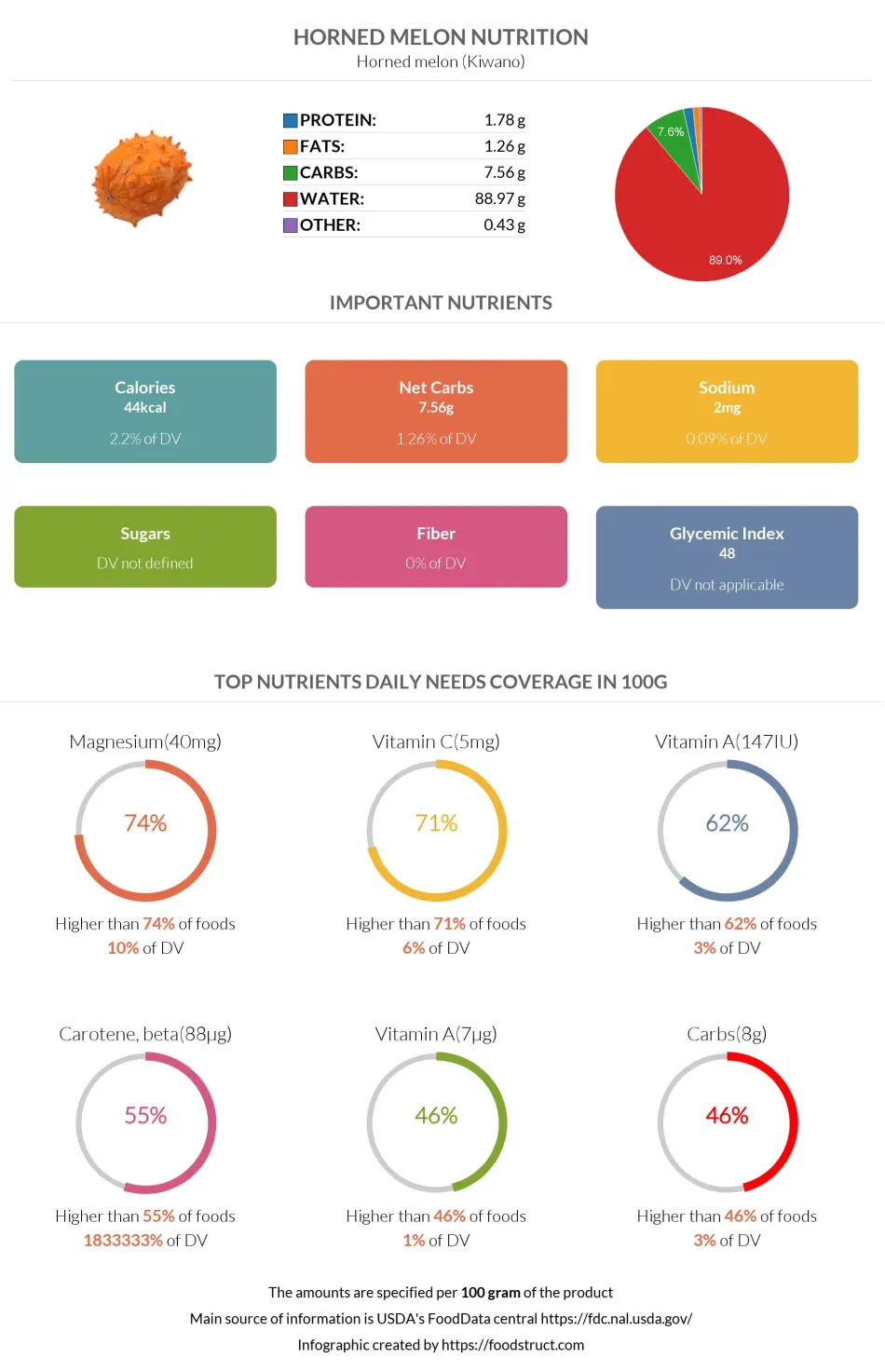
Infographic link
References
All the values for which the sources are not specified explicitly are taken from FDA’s Food Central. The exact link to the food presented on this page can be found below.
